Attached files
| file | filename |
|---|---|
| EX-99.1 - EX-99.1 - META FINANCIAL GROUP INC | ex991pressrelease62320.htm |
| EX-3.1 - EX-3.1 - META FINANCIAL GROUP INC | ex31meta-secondamendedan.htm |
| 8-K - 8-K - META FINANCIAL GROUP INC | cash-20200623.htm |
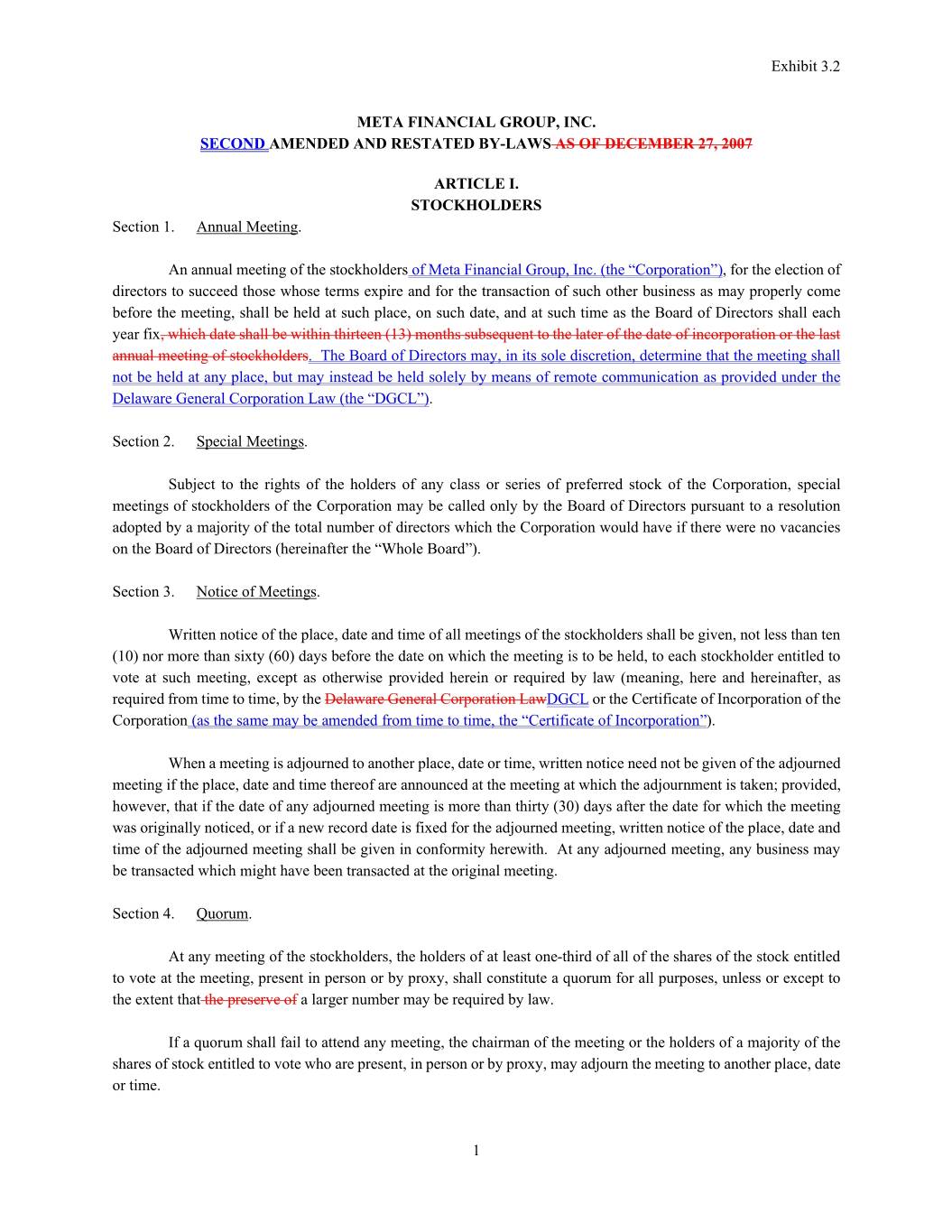
Exhibit 3.2 META FINANCIAL GROUP, INC. SECOND AMENDED AND RESTATED BY-LAWS AS OF DECEMBER 27, 2007 ARTICLE I. STOCKHOLDERS Section 1. Annual Meeting. An annual meeting of the stockholders of Meta Financial Group, Inc. (the “Corporation”), for the election of directors to succeed those whose terms expire and for the transaction of such other business as may properly come before the meeting, shall be held at such place, on such date, and at such time as the Board of Directors shall each year fix, which date shall be within thirteen (13) months subsequent to the later of the date of incorporation or the last annual meeting of stockholders. The Board of Directors may, in its sole discretion, determine that the meeting shall not be held at any place, but may instead be held solely by means of remote communication as provided under the Delaware General Corporation Law (the “DGCL”). Section 2. Special Meetings. Subject to the rights of the holders of any class or series of preferred stock of the Corporation, special meetings of stockholders of the Corporation may be called only by the Board of Directors pursuant to a resolution adopted by a majority of the total number of directors which the Corporation would have if there were no vacancies on the Board of Directors (hereinafter the “Whole Board”). Section 3. Notice of Meetings. Written notice of the place, date and time of all meetings of the stockholders shall be given, not less than ten (10) nor more than sixty (60) days before the date on which the meeting is to be held, to each stockholder entitled to vote at such meeting, except as otherwise provided herein or required by law (meaning, here and hereinafter, as required from time to time, by the Delaware General Corporation LawDGCL or the Certificate of Incorporation of the Corporation (as the same may be amended from time to time, the “Certificate of Incorporation”). When a meeting is adjourned to another place, date or time, written notice need not be given of the adjourned meeting if the place, date and time thereof are announced at the meeting at which the adjournment is taken; provided, however, that if the date of any adjourned meeting is more than thirty (30) days after the date for which the meeting was originally noticed, or if a new record date is fixed for the adjourned meeting, written notice of the place, date and time of the adjourned meeting shall be given in conformity herewith. At any adjourned meeting, any business may be transacted which might have been transacted at the original meeting. Section 4. Quorum. At any meeting of the stockholders, the holders of at least one-third of all of the shares of the stock entitled to vote at the meeting, present in person or by proxy, shall constitute a quorum for all purposes, unless or except to the extent that the preserve of a larger number may be required by law. If a quorum shall fail to attend any meeting, the chairman of the meeting or the holders of a majority of the shares of stock entitled to vote who are present, in person or by proxy, may adjourn the meeting to another place, date or time. 1
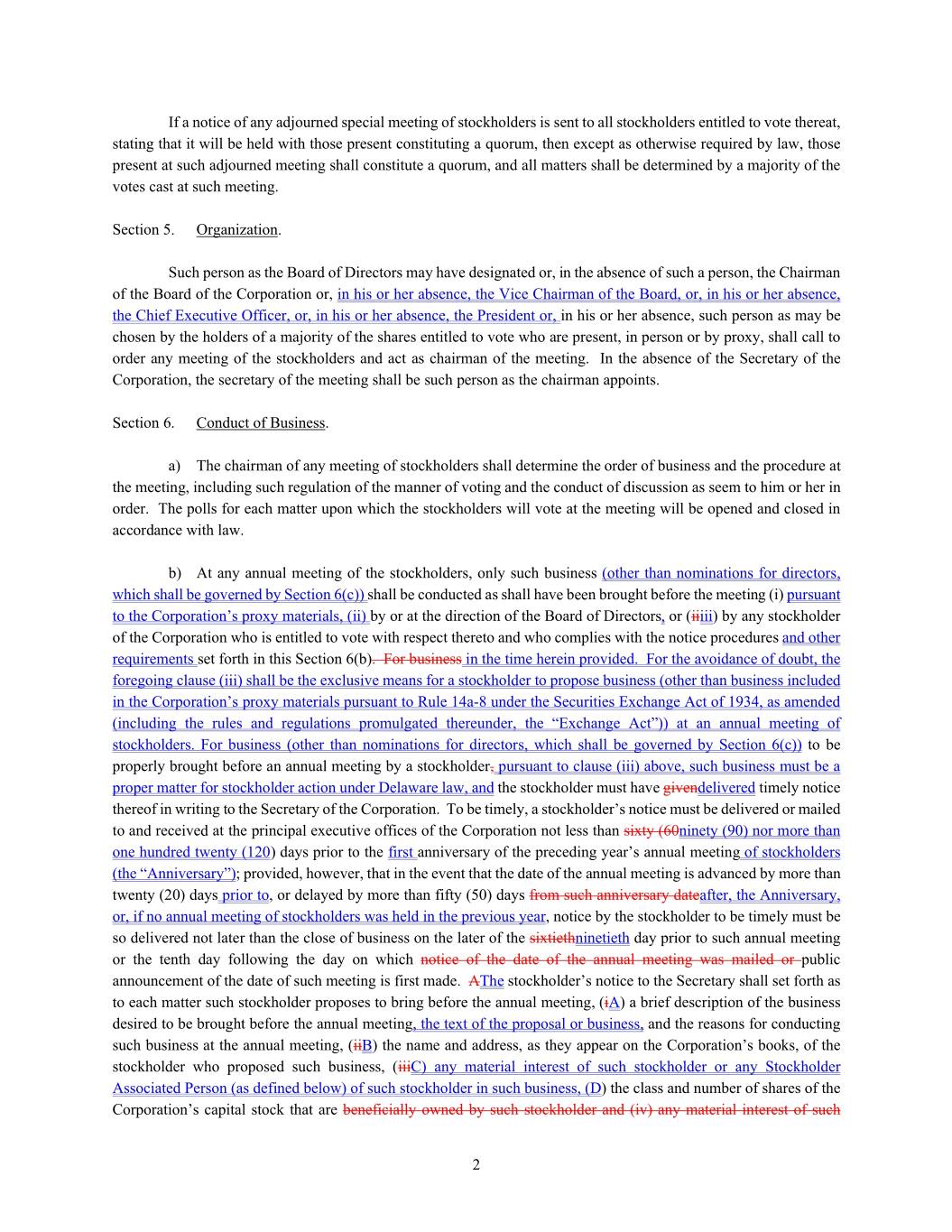
If a notice of any adjourned special meeting of stockholders is sent to all stockholders entitled to vote thereat, stating that it will be held with those present constituting a quorum, then except as otherwise required by law, those present at such adjourned meeting shall constitute a quorum, and all matters shall be determined by a majority of the votes cast at such meeting. Section 5. Organization. Such person as the Board of Directors may have designated or, in the absence of such a person, the Chairman of the Board of the Corporation or, in his or her absence, the Vice Chairman of the Board, or, in his or her absence, the Chief Executive Officer, or, in his or her absence, the President or, in his or her absence, such person as may be chosen by the holders of a majority of the shares entitled to vote who are present, in person or by proxy, shall call to order any meeting of the stockholders and act as chairman of the meeting. In the absence of the Secretary of the Corporation, the secretary of the meeting shall be such person as the chairman appoints. Section 6. Conduct of Business. a) The chairman of any meeting of stockholders shall determine the order of business and the procedure at the meeting, including such regulation of the manner of voting and the conduct of discussion as seem to him or her in order. The polls for each matter upon which the stockholders will vote at the meeting will be opened and closed in accordance with law. b) At any annual meeting of the stockholders, only such business (other than nominations for directors, which shall be governed by Section 6(c)) shall be conducted as shall have been brought before the meeting (i) pursuant to the Corporation’s proxy materials, (ii) by or at the direction of the Board of Directors, or (iiiii) by any stockholder of the Corporation who is entitled to vote with respect thereto and who complies with the notice procedures and other requirements set forth in this Section 6(b). For business in the time herein provided. For the avoidance of doubt, the foregoing clause (iii) shall be the exclusive means for a stockholder to propose business (other than business included in the Corporation’s proxy materials pursuant to Rule 14a-8 under the Securities Exchange Act of 1934, as amended (including the rules and regulations promulgated thereunder, the “Exchange Act”)) at an annual meeting of stockholders. For business (other than nominations for directors, which shall be governed by Section 6(c)) to be properly brought before an annual meeting by a stockholder, pursuant to clause (iii) above, such business must be a proper matter for stockholder action under Delaware law, and the stockholder must have givendelivered timely notice thereof in writing to the Secretary of the Corporation. To be timely, a stockholder’s notice must be delivered or mailed to and received at the principal executive offices of the Corporation not less than sixty (60ninety (90) nor more than one hundred twenty (120) days prior to the first anniversary of the preceding year’s annual meeting of stockholders (the “Anniversary”); provided, however, that in the event that the date of the annual meeting is advanced by more than twenty (20) days prior to, or delayed by more than fifty (50) days from such anniversary dateafter, the Anniversary, or, if no annual meeting of stockholders was held in the previous year, notice by the stockholder to be timely must be so delivered not later than the close of business on the later of the sixtiethninetieth day prior to such annual meeting or the tenth day following the day on which notice of the date of the annual meeting was mailed or public announcement of the date of such meeting is first made. AThe stockholder’s notice to the Secretary shall set forth as to each matter such stockholder proposes to bring before the annual meeting, (iA) a brief description of the business desired to be brought before the annual meeting, the text of the proposal or business, and the reasons for conducting such business at the annual meeting, (iiB) the name and address, as they appear on the Corporation’s books, of the stockholder who proposed such business, (iiiC) any material interest of such stockholder or any Stockholder Associated Person (as defined below) of such stockholder in such business, (D) the class and number of shares of the Corporation’s capital stock that are beneficially owned by such stockholder and (iv) any material interest of such 2
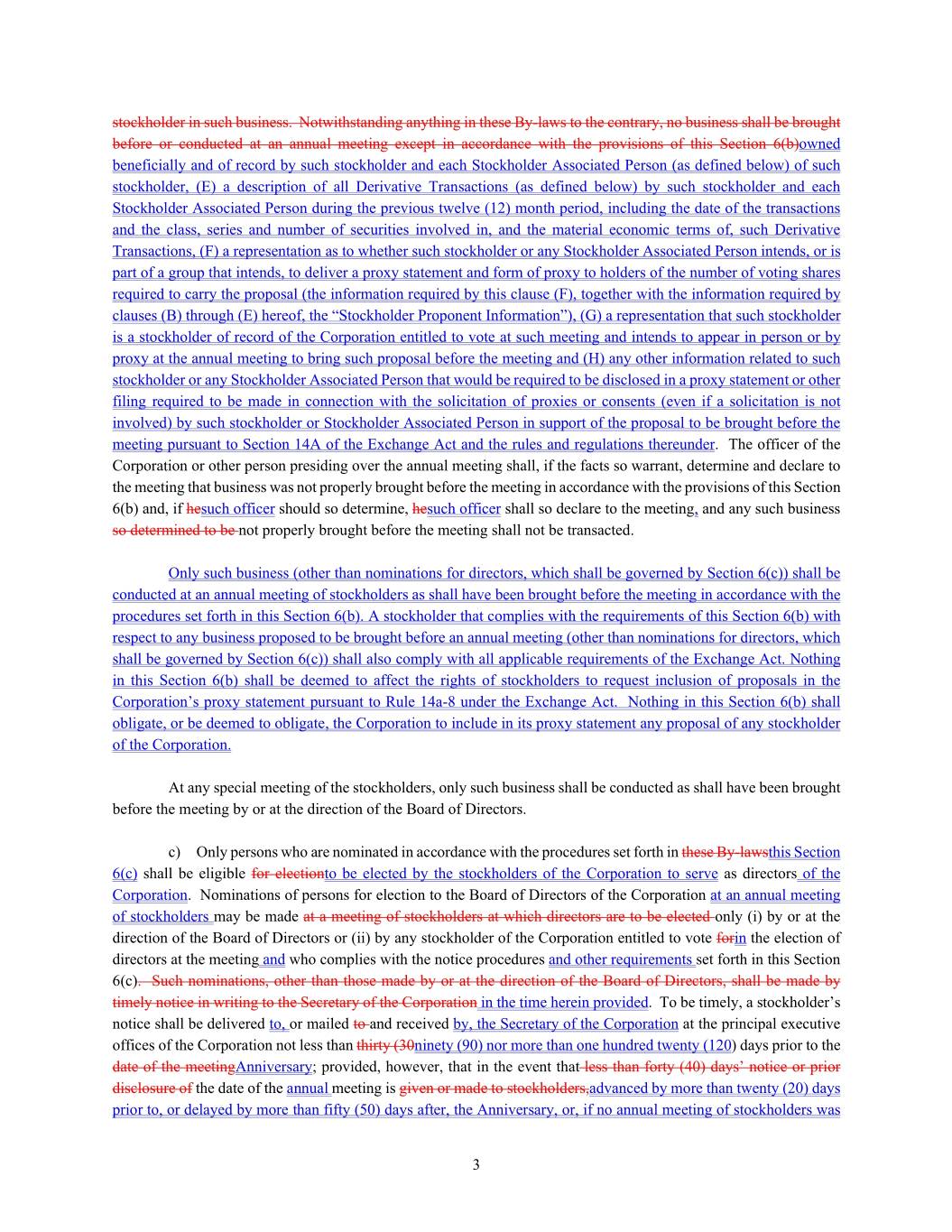
stockholder in such business. Notwithstanding anything in these By-laws to the contrary, no business shall be brought before or conducted at an annual meeting except in accordance with the provisions of this Section 6(b)owned beneficially and of record by such stockholder and each Stockholder Associated Person (as defined below) of such stockholder, (E) a description of all Derivative Transactions (as defined below) by such stockholder and each Stockholder Associated Person during the previous twelve (12) month period, including the date of the transactions and the class, series and number of securities involved in, and the material economic terms of, such Derivative Transactions, (F) a representation as to whether such stockholder or any Stockholder Associated Person intends, or is part of a group that intends, to deliver a proxy statement and form of proxy to holders of the number of voting shares required to carry the proposal (the information required by this clause (F), together with the information required by clauses (B) through (E) hereof, the “Stockholder Proponent Information”), (G) a representation that such stockholder is a stockholder of record of the Corporation entitled to vote at such meeting and intends to appear in person or by proxy at the annual meeting to bring such proposal before the meeting and (H) any other information related to such stockholder or any Stockholder Associated Person that would be required to be disclosed in a proxy statement or other filing required to be made in connection with the solicitation of proxies or consents (even if a solicitation is not involved) by such stockholder or Stockholder Associated Person in support of the proposal to be brought before the meeting pursuant to Section 14A of the Exchange Act and the rules and regulations thereunder. The officer of the Corporation or other person presiding over the annual meeting shall, if the facts so warrant, determine and declare to the meeting that business was not properly brought before the meeting in accordance with the provisions of this Section 6(b) and, if hesuch officer should so determine, hesuch officer shall so declare to the meeting, and any such business so determined to be not properly brought before the meeting shall not be transacted. Only such business (other than nominations for directors, which shall be governed by Section 6(c)) shall be conducted at an annual meeting of stockholders as shall have been brought before the meeting in accordance with the procedures set forth in this Section 6(b). A stockholder that complies with the requirements of this Section 6(b) with respect to any business proposed to be brought before an annual meeting (other than nominations for directors, which shall be governed by Section 6(c)) shall also comply with all applicable requirements of the Exchange Act. Nothing in this Section 6(b) shall be deemed to affect the rights of stockholders to request inclusion of proposals in the Corporation’s proxy statement pursuant to Rule 14a-8 under the Exchange Act. Nothing in this Section 6(b) shall obligate, or be deemed to obligate, the Corporation to include in its proxy statement any proposal of any stockholder of the Corporation. At any special meeting of the stockholders, only such business shall be conducted as shall have been brought before the meeting by or at the direction of the Board of Directors. c) Only persons who are nominated in accordance with the procedures set forth in these By-lawsthis Section 6(c) shall be eligible for electionto be elected by the stockholders of the Corporation to serve as directors of the Corporation. Nominations of persons for election to the Board of Directors of the Corporation at an annual meeting of stockholders may be made at a meeting of stockholders at which directors are to be elected only (i) by or at the direction of the Board of Directors or (ii) by any stockholder of the Corporation entitled to vote forin the election of directors at the meeting and who complies with the notice procedures and other requirements set forth in this Section 6(c). Such nominations, other than those made by or at the direction of the Board of Directors, shall be made by timely notice in writing to the Secretary of the Corporation in the time herein provided. To be timely, a stockholder’s notice shall be delivered to, or mailed to and received by, the Secretary of the Corporation at the principal executive offices of the Corporation not less than thirty (30ninety (90) nor more than one hundred twenty (120) days prior to the date of the meetingAnniversary; provided, however, that in the event that less than forty (40) days’ notice or prior disclosure of the date of the annual meeting is given or made to stockholders,advanced by more than twenty (20) days prior to, or delayed by more than fifty (50) days after, the Anniversary, or, if no annual meeting of stockholders was 3
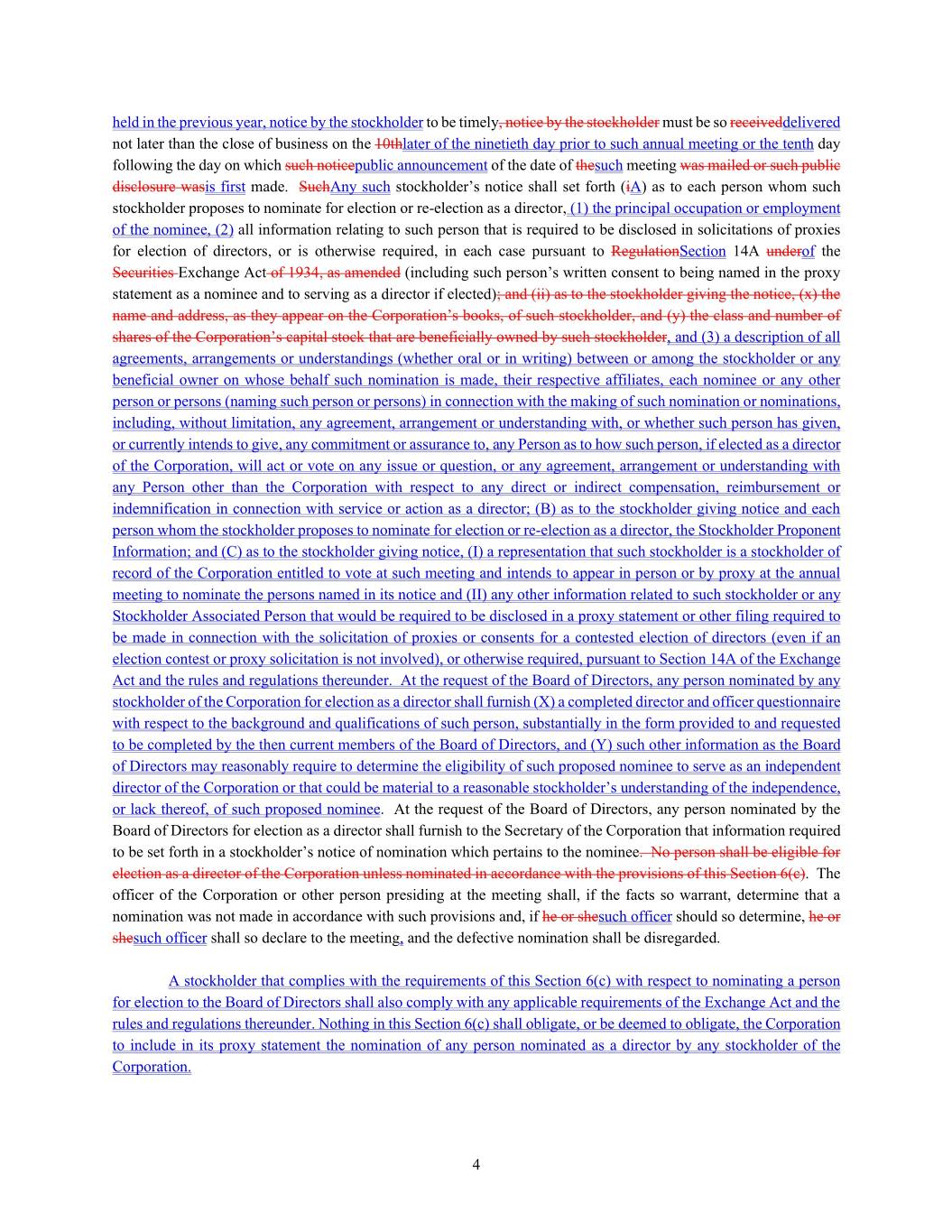
held in the previous year, notice by the stockholder to be timely, notice by the stockholder must be so receiveddelivered not later than the close of business on the 10thlater of the ninetieth day prior to such annual meeting or the tenth day following the day on which such noticepublic announcement of the date of thesuch meeting was mailed or such public disclosure wasis first made. SuchAny such stockholder’s notice shall set forth (iA) as to each person whom such stockholder proposes to nominate for election or re-election as a director, (1) the principal occupation or employment of the nominee, (2) all information relating to such person that is required to be disclosed in solicitations of proxies for election of directors, or is otherwise required, in each case pursuant to RegulationSection 14A underof the Securities Exchange Act of 1934, as amended (including such person’s written consent to being named in the proxy statement as a nominee and to serving as a director if elected); and (ii) as to the stockholder giving the notice, (x) the name and address, as they appear on the Corporation’s books, of such stockholder, and (y) the class and number of shares of the Corporation’s capital stock that are beneficially owned by such stockholder, and (3) a description of all agreements, arrangements or understandings (whether oral or in writing) between or among the stockholder or any beneficial owner on whose behalf such nomination is made, their respective affiliates, each nominee or any other person or persons (naming such person or persons) in connection with the making of such nomination or nominations, including, without limitation, any agreement, arrangement or understanding with, or whether such person has given, or currently intends to give, any commitment or assurance to, any Person as to how such person, if elected as a director of the Corporation, will act or vote on any issue or question, or any agreement, arrangement or understanding with any Person other than the Corporation with respect to any direct or indirect compensation, reimbursement or indemnification in connection with service or action as a director; (B) as to the stockholder giving notice and each person whom the stockholder proposes to nominate for election or re-election as a director, the Stockholder Proponent Information; and (C) as to the stockholder giving notice, (I) a representation that such stockholder is a stockholder of record of the Corporation entitled to vote at such meeting and intends to appear in person or by proxy at the annual meeting to nominate the persons named in its notice and (II) any other information related to such stockholder or any Stockholder Associated Person that would be required to be disclosed in a proxy statement or other filing required to be made in connection with the solicitation of proxies or consents for a contested election of directors (even if an election contest or proxy solicitation is not involved), or otherwise required, pursuant to Section 14A of the Exchange Act and the rules and regulations thereunder. At the request of the Board of Directors, any person nominated by any stockholder of the Corporation for election as a director shall furnish (X) a completed director and officer questionnaire with respect to the background and qualifications of such person, substantially in the form provided to and requested to be completed by the then current members of the Board of Directors, and (Y) such other information as the Board of Directors may reasonably require to determine the eligibility of such proposed nominee to serve as an independent director of the Corporation or that could be material to a reasonable stockholder’s understanding of the independence, or lack thereof, of such proposed nominee. At the request of the Board of Directors, any person nominated by the Board of Directors for election as a director shall furnish to the Secretary of the Corporation that information required to be set forth in a stockholder’s notice of nomination which pertains to the nominee. No person shall be eligible for election as a director of the Corporation unless nominated in accordance with the provisions of this Section 6(c). The officer of the Corporation or other person presiding at the meeting shall, if the facts so warrant, determine that a nomination was not made in accordance with such provisions and, if he or shesuch officer should so determine, he or shesuch officer shall so declare to the meeting, and the defective nomination shall be disregarded. A stockholder that complies with the requirements of this Section 6(c) with respect to nominating a person for election to the Board of Directors shall also comply with any applicable requirements of the Exchange Act and the rules and regulations thereunder. Nothing in this Section 6(c) shall obligate, or be deemed to obligate, the Corporation to include in its proxy statement the nomination of any person nominated as a director by any stockholder of the Corporation. 4
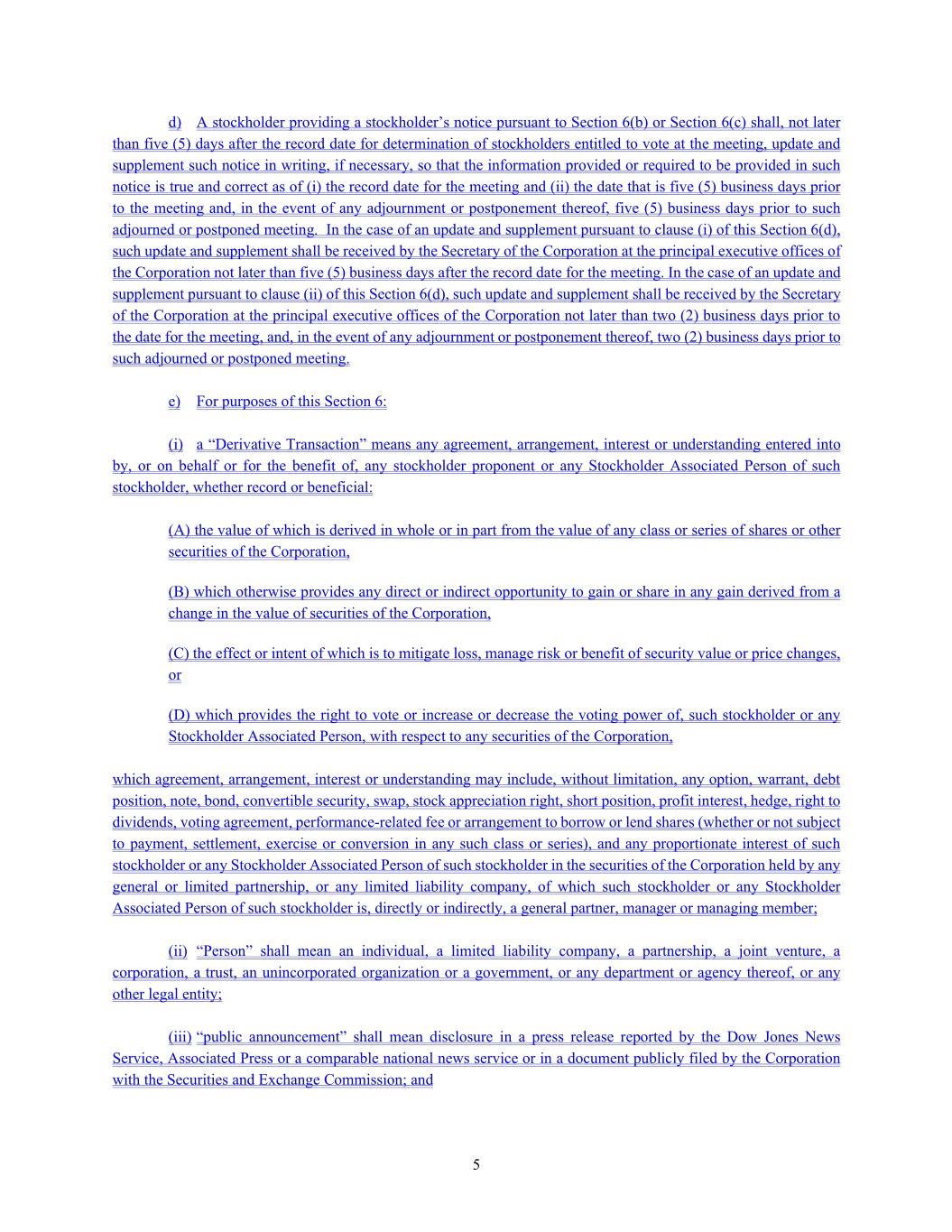
d) A stockholder providing a stockholder’s notice pursuant to Section 6(b) or Section 6(c) shall, not later than five (5) days after the record date for determination of stockholders entitled to vote at the meeting, update and supplement such notice in writing, if necessary, so that the information provided or required to be provided in such notice is true and correct as of (i) the record date for the meeting and (ii) the date that is five (5) business days prior to the meeting and, in the event of any adjournment or postponement thereof, five (5) business days prior to such adjourned or postponed meeting. In the case of an update and supplement pursuant to clause (i) of this Section 6(d), such update and supplement shall be received by the Secretary of the Corporation at the principal executive offices of the Corporation not later than five (5) business days after the record date for the meeting. In the case of an update and supplement pursuant to clause (ii) of this Section 6(d), such update and supplement shall be received by the Secretary of the Corporation at the principal executive offices of the Corporation not later than two (2) business days prior to the date for the meeting, and, in the event of any adjournment or postponement thereof, two (2) business days prior to such adjourned or postponed meeting. e) For purposes of this Section 6: (i) a “Derivative Transaction” means any agreement, arrangement, interest or understanding entered into by, or on behalf or for the benefit of, any stockholder proponent or any Stockholder Associated Person of such stockholder, whether record or beneficial: (A) the value of which is derived in whole or in part from the value of any class or series of shares or other securities of the Corporation, (B) which otherwise provides any direct or indirect opportunity to gain or share in any gain derived from a change in the value of securities of the Corporation, (C) the effect or intent of which is to mitigate loss, manage risk or benefit of security value or price changes, or (D) which provides the right to vote or increase or decrease the voting power of, such stockholder or any Stockholder Associated Person, with respect to any securities of the Corporation, which agreement, arrangement, interest or understanding may include, without limitation, any option, warrant, debt position, note, bond, convertible security, swap, stock appreciation right, short position, profit interest, hedge, right to dividends, voting agreement, performance-related fee or arrangement to borrow or lend shares (whether or not subject to payment, settlement, exercise or conversion in any such class or series), and any proportionate interest of such stockholder or any Stockholder Associated Person of such stockholder in the securities of the Corporation held by any general or limited partnership, or any limited liability company, of which such stockholder or any Stockholder Associated Person of such stockholder is, directly or indirectly, a general partner, manager or managing member; (ii) “Person” shall mean an individual, a limited liability company, a partnership, a joint venture, a corporation, a trust, an unincorporated organization or a government, or any department or agency thereof, or any other legal entity; (iii) “public announcement” shall mean disclosure in a press release reported by the Dow Jones News Service, Associated Press or a comparable national news service or in a document publicly filed by the Corporation with the Securities and Exchange Commission; and 5
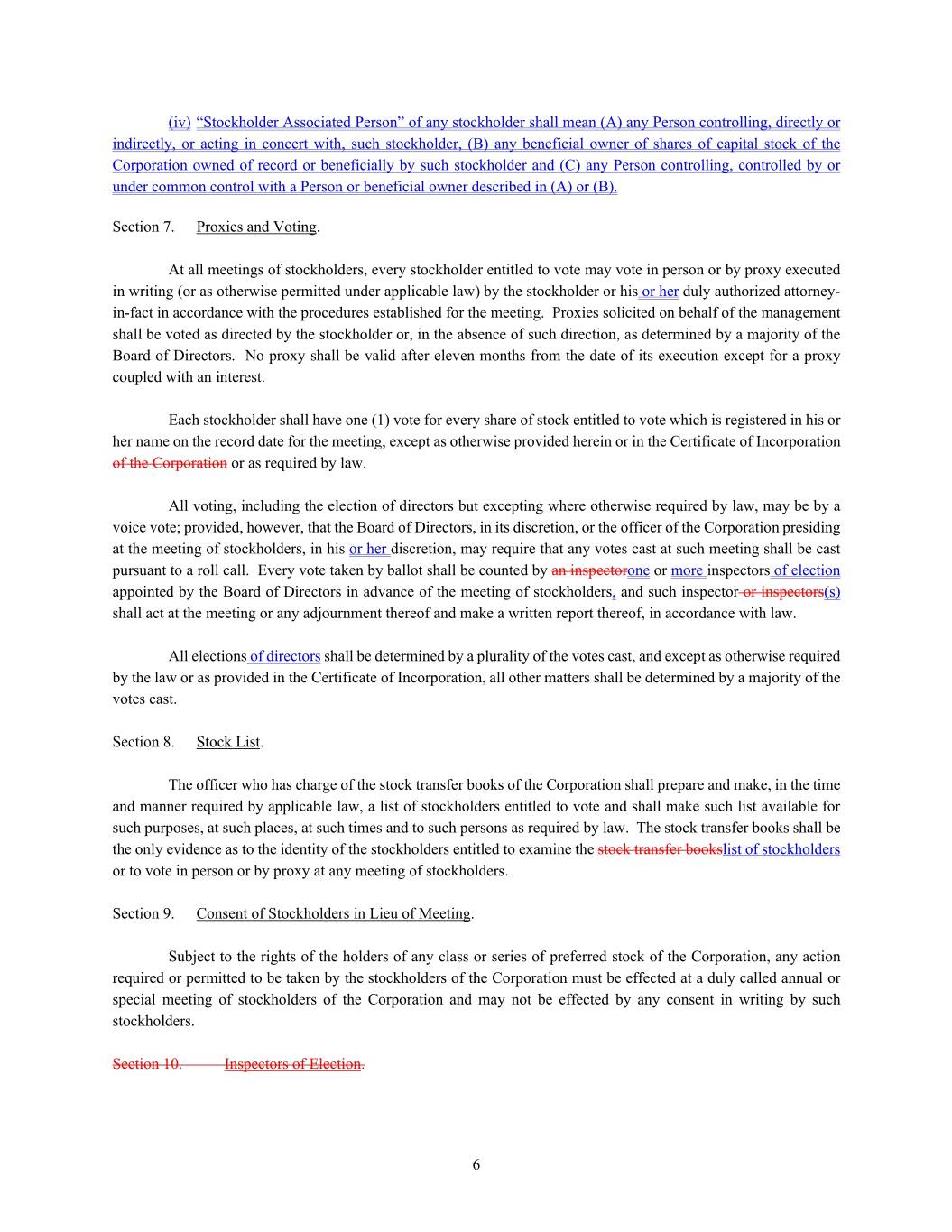
(iv) “Stockholder Associated Person” of any stockholder shall mean (A) any Person controlling, directly or indirectly, or acting in concert with, such stockholder, (B) any beneficial owner of shares of capital stock of the Corporation owned of record or beneficially by such stockholder and (C) any Person controlling, controlled by or under common control with a Person or beneficial owner described in (A) or (B). Section 7. Proxies and Voting. At all meetings of stockholders, every stockholder entitled to vote may vote in person or by proxy executed in writing (or as otherwise permitted under applicable law) by the stockholder or his or her duly authorized attorney- in-fact in accordance with the procedures established for the meeting. Proxies solicited on behalf of the management shall be voted as directed by the stockholder or, in the absence of such direction, as determined by a majority of the Board of Directors. No proxy shall be valid after eleven months from the date of its execution except for a proxy coupled with an interest. Each stockholder shall have one (1) vote for every share of stock entitled to vote which is registered in his or her name on the record date for the meeting, except as otherwise provided herein or in the Certificate of Incorporation of the Corporation or as required by law. All voting, including the election of directors but excepting where otherwise required by law, may be by a voice vote; provided, however, that the Board of Directors, in its discretion, or the officer of the Corporation presiding at the meeting of stockholders, in his or her discretion, may require that any votes cast at such meeting shall be cast pursuant to a roll call. Every vote taken by ballot shall be counted by an inspectorone or more inspectors of election appointed by the Board of Directors in advance of the meeting of stockholders, and such inspector or inspectors(s) shall act at the meeting or any adjournment thereof and make a written report thereof, in accordance with law. All elections of directors shall be determined by a plurality of the votes cast, and except as otherwise required by the law or as provided in the Certificate of Incorporation, all other matters shall be determined by a majority of the votes cast. Section 8. Stock List. The officer who has charge of the stock transfer books of the Corporation shall prepare and make, in the time and manner required by applicable law, a list of stockholders entitled to vote and shall make such list available for such purposes, at such places, at such times and to such persons as required by law. The stock transfer books shall be the only evidence as to the identity of the stockholders entitled to examine the stock transfer bookslist of stockholders or to vote in person or by proxy at any meeting of stockholders. Section 9. Consent of Stockholders in Lieu of Meeting. Subject to the rights of the holders of any class or series of preferred stock of the Corporation, any action required or permitted to be taken by the stockholders of the Corporation must be effected at a duly called annual or special meeting of stockholders of the Corporation and may not be effected by any consent in writing by such stockholders. Section 10. Inspectors of Election. 6
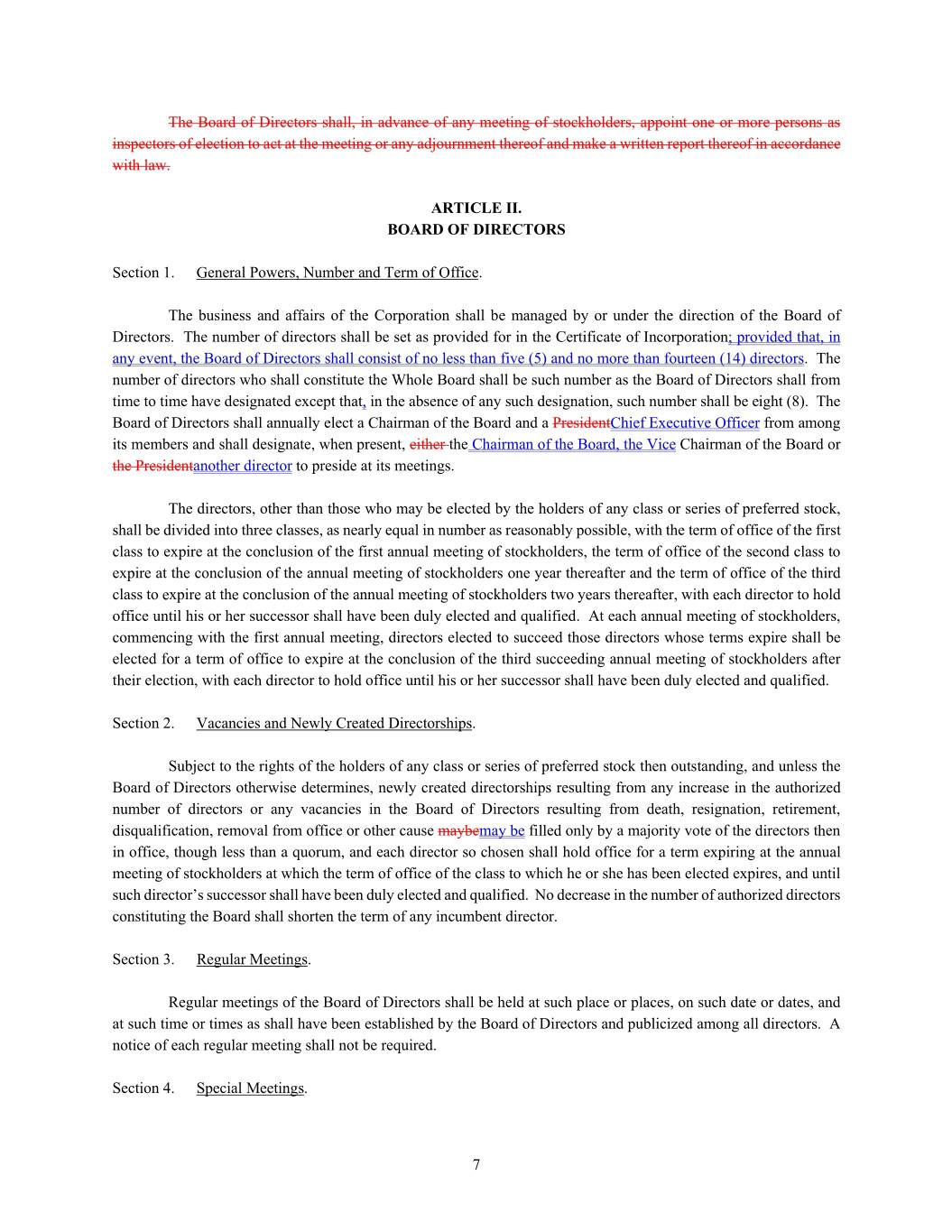
The Board of Directors shall, in advance of any meeting of stockholders, appoint one or more persons as inspectors of election to act at the meeting or any adjournment thereof and make a written report thereof in accordance with law. ARTICLE II. BOARD OF DIRECTORS Section 1. General Powers, Number and Term of Office. The business and affairs of the Corporation shall be managed by or under the direction of the Board of Directors. The number of directors shall be set as provided for in the Certificate of Incorporation; provided that, in any event, the Board of Directors shall consist of no less than five (5) and no more than fourteen (14) directors. The number of directors who shall constitute the Whole Board shall be such number as the Board of Directors shall from time to time have designated except that, in the absence of any such designation, such number shall be eight (8). The Board of Directors shall annually elect a Chairman of the Board and a PresidentChief Executive Officer from among its members and shall designate, when present, either the Chairman of the Board, the Vice Chairman of the Board or the Presidentanother director to preside at its meetings. The directors, other than those who may be elected by the holders of any class or series of preferred stock, shall be divided into three classes, as nearly equal in number as reasonably possible, with the term of office of the first class to expire at the conclusion of the first annual meeting of stockholders, the term of office of the second class to expire at the conclusion of the annual meeting of stockholders one year thereafter and the term of office of the third class to expire at the conclusion of the annual meeting of stockholders two years thereafter, with each director to hold office until his or her successor shall have been duly elected and qualified. At each annual meeting of stockholders, commencing with the first annual meeting, directors elected to succeed those directors whose terms expire shall be elected for a term of office to expire at the conclusion of the third succeeding annual meeting of stockholders after their election, with each director to hold office until his or her successor shall have been duly elected and qualified. Section 2. Vacancies and Newly Created Directorships. Subject to the rights of the holders of any class or series of preferred stock then outstanding, and unless the Board of Directors otherwise determines, newly created directorships resulting from any increase in the authorized number of directors or any vacancies in the Board of Directors resulting from death, resignation, retirement, disqualification, removal from office or other cause maybemay be filled only by a majority vote of the directors then in office, though less than a quorum, and each director so chosen shall hold office for a term expiring at the annual meeting of stockholders at which the term of office of the class to which he or she has been elected expires, and until such director’s successor shall have been duly elected and qualified. No decrease in the number of authorized directors constituting the Board shall shorten the term of any incumbent director. Section 3. Regular Meetings. Regular meetings of the Board of Directors shall be held at such place or places, on such date or dates, and at such time or times as shall have been established by the Board of Directors and publicized among all directors. A notice of each regular meeting shall not be required. Section 4. Special Meetings. 7
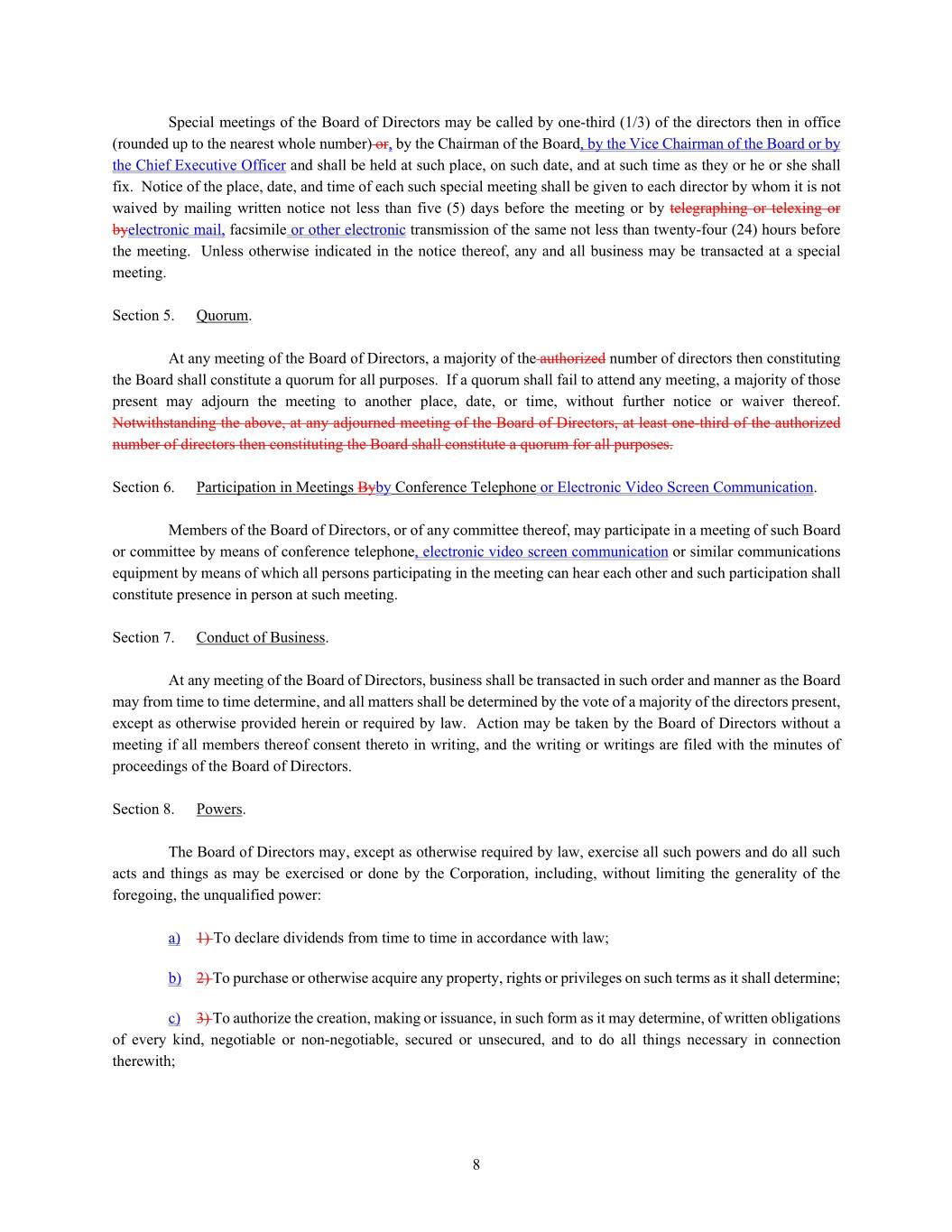
Special meetings of the Board of Directors may be called by one-third (1/3) of the directors then in office (rounded up to the nearest whole number) or, by the Chairman of the Board, by the Vice Chairman of the Board or by the Chief Executive Officer and shall be held at such place, on such date, and at such time as they or he or she shall fix. Notice of the place, date, and time of each such special meeting shall be given to each director by whom it is not waived by mailing written notice not less than five (5) days before the meeting or by telegraphing or telexing or byelectronic mail, facsimile or other electronic transmission of the same not less than twenty-four (24) hours before the meeting. Unless otherwise indicated in the notice thereof, any and all business may be transacted at a special meeting. Section 5. Quorum. At any meeting of the Board of Directors, a majority of the authorized number of directors then constituting the Board shall constitute a quorum for all purposes. If a quorum shall fail to attend any meeting, a majority of those present may adjourn the meeting to another place, date, or time, without further notice or waiver thereof. Notwithstanding the above, at any adjourned meeting of the Board of Directors, at least one-third of the authorized number of directors then constituting the Board shall constitute a quorum for all purposes. Section 6. Participation in Meetings Byby Conference Telephone or Electronic Video Screen Communication. Members of the Board of Directors, or of any committee thereof, may participate in a meeting of such Board or committee by means of conference telephone, electronic video screen communication or similar communications equipment by means of which all persons participating in the meeting can hear each other and such participation shall constitute presence in person at such meeting. Section 7. Conduct of Business. At any meeting of the Board of Directors, business shall be transacted in such order and manner as the Board may from time to time determine, and all matters shall be determined by the vote of a majority of the directors present, except as otherwise provided herein or required by law. Action may be taken by the Board of Directors without a meeting if all members thereof consent thereto in writing, and the writing or writings are filed with the minutes of proceedings of the Board of Directors. Section 8. Powers. The Board of Directors may, except as otherwise required by law, exercise all such powers and do all such acts and things as may be exercised or done by the Corporation, including, without limiting the generality of the foregoing, the unqualified power: a) 1) To declare dividends from time to time in accordance with law; b) 2) To purchase or otherwise acquire any property, rights or privileges on such terms as it shall determine; c) 3) To authorize the creation, making or issuance, in such form as it may determine, of written obligations of every kind, negotiable or non-negotiable, secured or unsecured, and to do all things necessary in connection therewith; 8
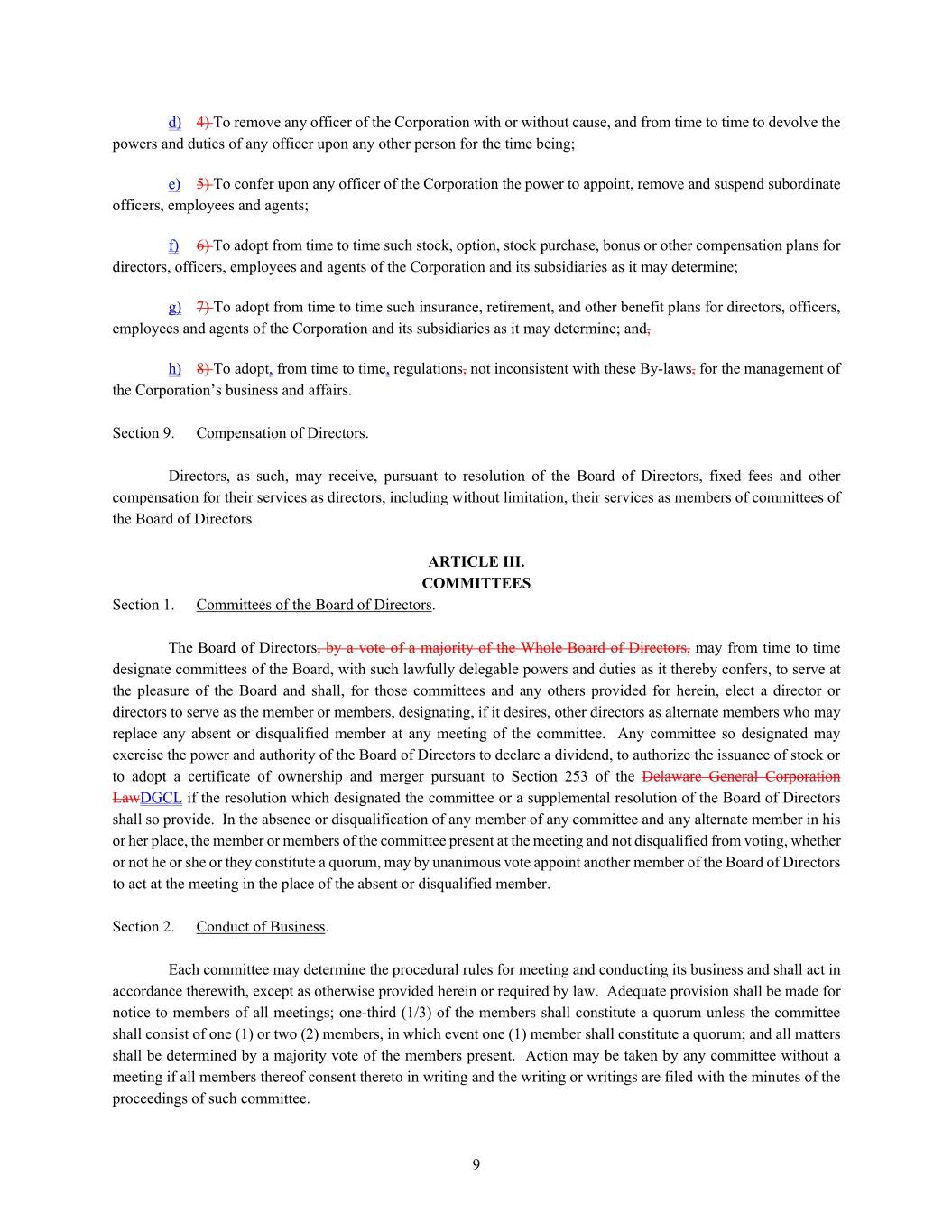
d) 4) To remove any officer of the Corporation with or without cause, and from time to time to devolve the powers and duties of any officer upon any other person for the time being; e) 5) To confer upon any officer of the Corporation the power to appoint, remove and suspend subordinate officers, employees and agents; f) 6) To adopt from time to time such stock, option, stock purchase, bonus or other compensation plans for directors, officers, employees and agents of the Corporation and its subsidiaries as it may determine; g) 7) To adopt from time to time such insurance, retirement, and other benefit plans for directors, officers, employees and agents of the Corporation and its subsidiaries as it may determine; and, h) 8) To adopt, from time to time, regulations, not inconsistent with these By-laws, for the management of the Corporation’s business and affairs. Section 9. Compensation of Directors. Directors, as such, may receive, pursuant to resolution of the Board of Directors, fixed fees and other compensation for their services as directors, including without limitation, their services as members of committees of the Board of Directors. ARTICLE III. COMMITTEES Section 1. Committees of the Board of Directors. The Board of Directors, by a vote of a majority of the Whole Board of Directors, may from time to time designate committees of the Board, with such lawfully delegable powers and duties as it thereby confers, to serve at the pleasure of the Board and shall, for those committees and any others provided for herein, elect a director or directors to serve as the member or members, designating, if it desires, other directors as alternate members who may replace any absent or disqualified member at any meeting of the committee. Any committee so designated may exercise the power and authority of the Board of Directors to declare a dividend, to authorize the issuance of stock or to adopt a certificate of ownership and merger pursuant to Section 253 of the Delaware General Corporation LawDGCL if the resolution which designated the committee or a supplemental resolution of the Board of Directors shall so provide. In the absence or disqualification of any member of any committee and any alternate member in his or her place, the member or members of the committee present at the meeting and not disqualified from voting, whether or not he or she or they constitute a quorum, may by unanimous vote appoint another member of the Board of Directors to act at the meeting in the place of the absent or disqualified member. Section 2. Conduct of Business. Each committee may determine the procedural rules for meeting and conducting its business and shall act in accordance therewith, except as otherwise provided herein or required by law. Adequate provision shall be made for notice to members of all meetings; one-third (1/3) of the members shall constitute a quorum unless the committee shall consist of one (1) or two (2) members, in which event one (1) member shall constitute a quorum; and all matters shall be determined by a majority vote of the members present. Action may be taken by any committee without a meeting if all members thereof consent thereto in writing and the writing or writings are filed with the minutes of the proceedings of such committee. 9
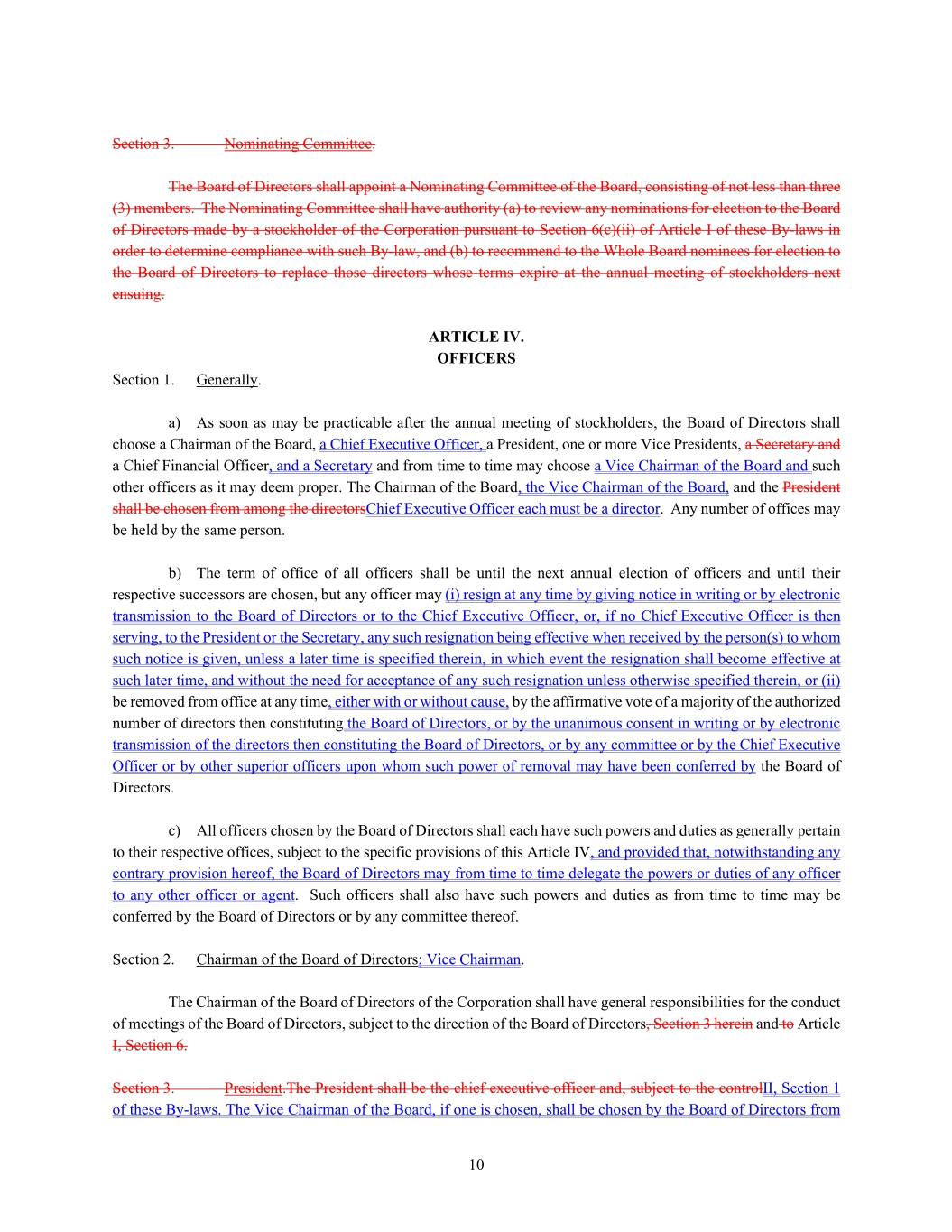
Section 3. Nominating Committee. The Board of Directors shall appoint a Nominating Committee of the Board, consisting of not less than three (3) members. The Nominating Committee shall have authority (a) to review any nominations for election to the Board of Directors made by a stockholder of the Corporation pursuant to Section 6(c)(ii) of Article I of these By-laws in order to determine compliance with such By-law, and (b) to recommend to the Whole Board nominees for election to the Board of Directors to replace those directors whose terms expire at the annual meeting of stockholders next ensuing. ARTICLE IV. OFFICERS Section 1. Generally. a) As soon as may be practicable after the annual meeting of stockholders, the Board of Directors shall choose a Chairman of the Board, a Chief Executive Officer, a President, one or more Vice Presidents, a Secretary and a Chief Financial Officer, and a Secretary and from time to time may choose a Vice Chairman of the Board and such other officers as it may deem proper. The Chairman of the Board, the Vice Chairman of the Board, and the President shall be chosen from among the directorsChief Executive Officer each must be a director. Any number of offices may be held by the same person. b) The term of office of all officers shall be until the next annual election of officers and until their respective successors are chosen, but any officer may (i) resign at any time by giving notice in writing or by electronic transmission to the Board of Directors or to the Chief Executive Officer, or, if no Chief Executive Officer is then serving, to the President or the Secretary, any such resignation being effective when received by the person(s) to whom such notice is given, unless a later time is specified therein, in which event the resignation shall become effective at such later time, and without the need for acceptance of any such resignation unless otherwise specified therein, or (ii) be removed from office at any time, either with or without cause, by the affirmative vote of a majority of the authorized number of directors then constituting the Board of Directors, or by the unanimous consent in writing or by electronic transmission of the directors then constituting the Board of Directors, or by any committee or by the Chief Executive Officer or by other superior officers upon whom such power of removal may have been conferred by the Board of Directors. c) All officers chosen by the Board of Directors shall each have such powers and duties as generally pertain to their respective offices, subject to the specific provisions of this Article IV, and provided that, notwithstanding any contrary provision hereof, the Board of Directors may from time to time delegate the powers or duties of any officer to any other officer or agent. Such officers shall also have such powers and duties as from time to time may be conferred by the Board of Directors or by any committee thereof. Section 2. Chairman of the Board of Directors; Vice Chairman. The Chairman of the Board of Directors of the Corporation shall have general responsibilities for the conduct of meetings of the Board of Directors, subject to the direction of the Board of Directors, Section 3 herein and to Article I, Section 6. Section 3. President.The President shall be the chief executive officer and, subject to the controlII, Section 1 of these By-laws. The Vice Chairman of the Board, if one is chosen, shall be chosen by the Board of Directors from 10
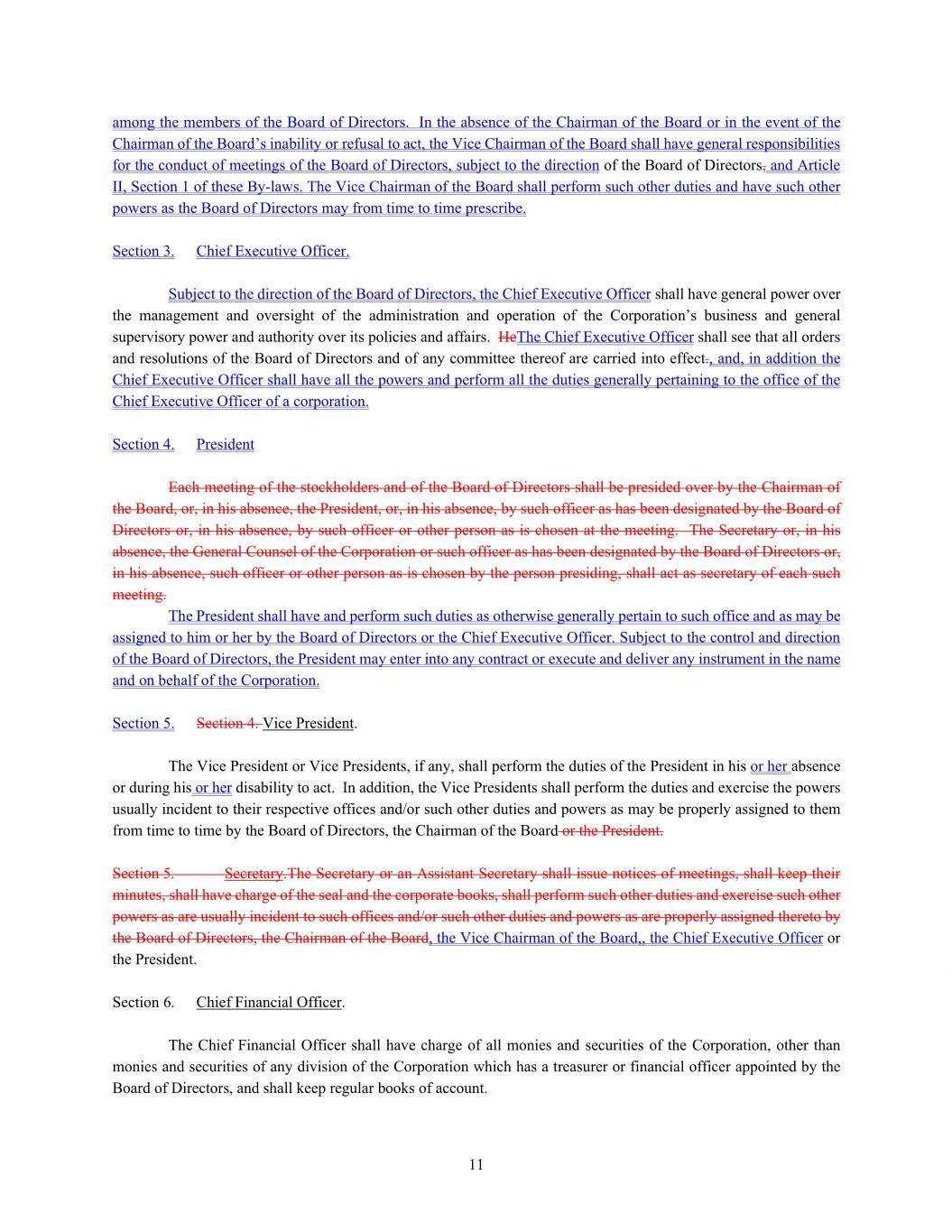
among the members of the Board of Directors. In the absence of the Chairman of the Board or in the event of the Chairman of the Board’s inability or refusal to act, the Vice Chairman of the Board shall have general responsibilities for the conduct of meetings of the Board of Directors, subject to the direction of the Board of Directors, and Article II, Section 1 of these By-laws. The Vice Chairman of the Board shall perform such other duties and have such other powers as the Board of Directors may from time to time prescribe. Section 3. Chief Executive Officer. Subject to the direction of the Board of Directors, the Chief Executive Officer shall have general power over the management and oversight of the administration and operation of the Corporation’s business and general supervisory power and authority over its policies and affairs. HeThe Chief Executive Officer shall see that all orders and resolutions of the Board of Directors and of any committee thereof are carried into effect., and, in addition the Chief Executive Officer shall have all the powers and perform all the duties generally pertaining to the office of the Chief Executive Officer of a corporation. Section 4. President Each meeting of the stockholders and of the Board of Directors shall be presided over by the Chairman of the Board, or, in his absence, the President, or, in his absence, by such officer as has been designated by the Board of Directors or, in his absence, by such officer or other person as is chosen at the meeting. The Secretary or, in his absence, the General Counsel of the Corporation or such officer as has been designated by the Board of Directors or, in his absence, such officer or other person as is chosen by the person presiding, shall act as secretary of each such meeting. The President shall have and perform such duties as otherwise generally pertain to such office and as may be assigned to him or her by the Board of Directors or the Chief Executive Officer. Subject to the control and direction of the Board of Directors, the President may enter into any contract or execute and deliver any instrument in the name and on behalf of the Corporation. Section 5. Section 4. Vice President. The Vice President or Vice Presidents, if any, shall perform the duties of the President in his or her absence or during his or her disability to act. In addition, the Vice Presidents shall perform the duties and exercise the powers usually incident to their respective offices and/or such other duties and powers as may be properly assigned to them from time to time by the Board of Directors, the Chairman of the Board or the President. Section 5. Secretary.The Secretary or an Assistant Secretary shall issue notices of meetings, shall keep their minutes, shall have charge of the seal and the corporate books, shall perform such other duties and exercise such other powers as are usually incident to such offices and/or such other duties and powers as are properly assigned thereto by the Board of Directors, the Chairman of the Board, the Vice Chairman of the Board,, the Chief Executive Officer or the President. Section 6. Chief Financial Officer. The Chief Financial Officer shall have charge of all monies and securities of the Corporation, other than monies and securities of any division of the Corporation which has a treasurer or financial officer appointed by the Board of Directors, and shall keep regular books of account. 11
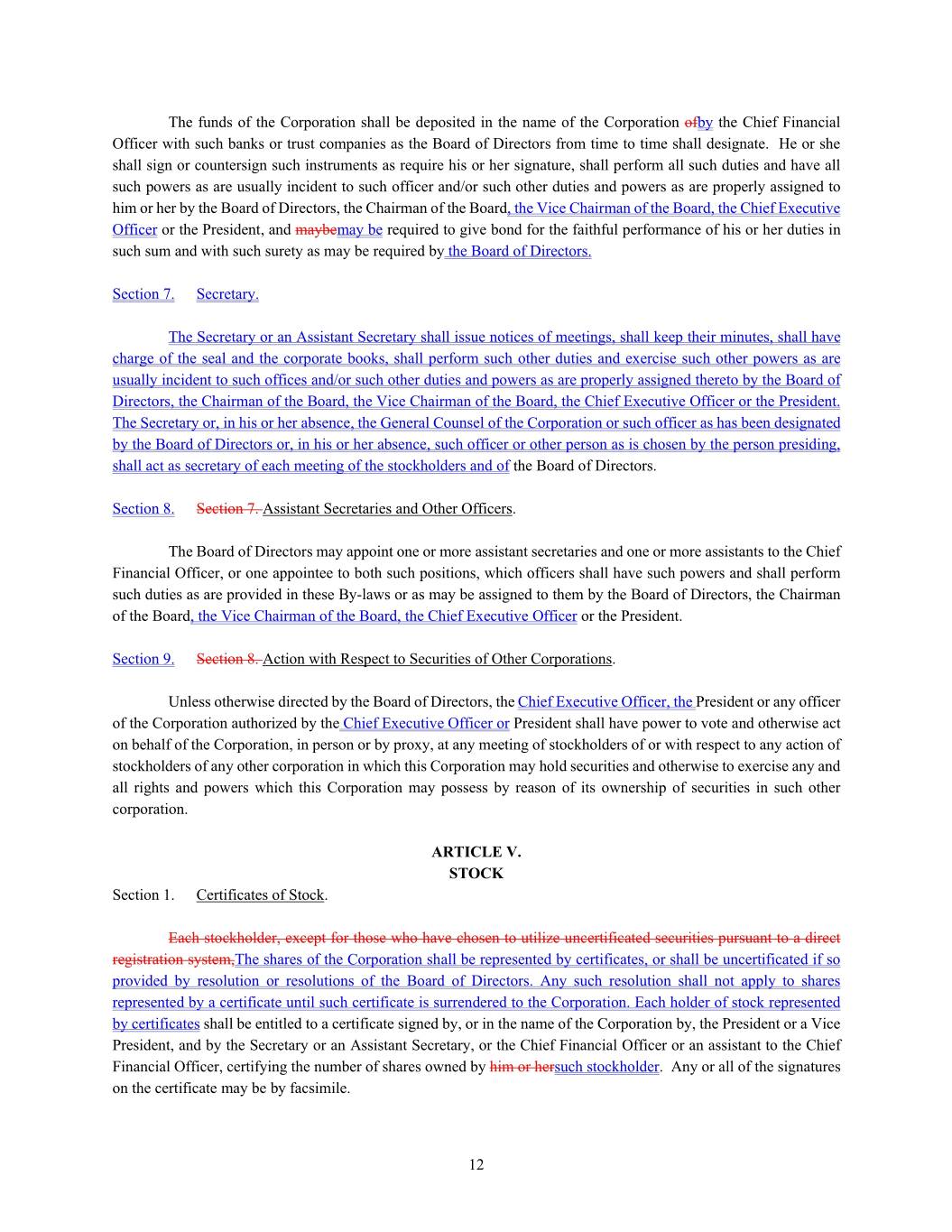
The funds of the Corporation shall be deposited in the name of the Corporation ofby the Chief Financial Officer with such banks or trust companies as the Board of Directors from time to time shall designate. He or she shall sign or countersign such instruments as require his or her signature, shall perform all such duties and have all such powers as are usually incident to such officer and/or such other duties and powers as are properly assigned to him or her by the Board of Directors, the Chairman of the Board, the Vice Chairman of the Board, the Chief Executive Officer or the President, and maybemay be required to give bond for the faithful performance of his or her duties in such sum and with such surety as may be required by the Board of Directors. Section 7. Secretary. The Secretary or an Assistant Secretary shall issue notices of meetings, shall keep their minutes, shall have charge of the seal and the corporate books, shall perform such other duties and exercise such other powers as are usually incident to such offices and/or such other duties and powers as are properly assigned thereto by the Board of Directors, the Chairman of the Board, the Vice Chairman of the Board, the Chief Executive Officer or the President. The Secretary or, in his or her absence, the General Counsel of the Corporation or such officer as has been designated by the Board of Directors or, in his or her absence, such officer or other person as is chosen by the person presiding, shall act as secretary of each meeting of the stockholders and of the Board of Directors. Section 8. Section 7. Assistant Secretaries and Other Officers. The Board of Directors may appoint one or more assistant secretaries and one or more assistants to the Chief Financial Officer, or one appointee to both such positions, which officers shall have such powers and shall perform such duties as are provided in these By-laws or as may be assigned to them by the Board of Directors, the Chairman of the Board, the Vice Chairman of the Board, the Chief Executive Officer or the President. Section 9. Section 8. Action with Respect to Securities of Other Corporations. Unless otherwise directed by the Board of Directors, the Chief Executive Officer, the President or any officer of the Corporation authorized by the Chief Executive Officer or President shall have power to vote and otherwise act on behalf of the Corporation, in person or by proxy, at any meeting of stockholders of or with respect to any action of stockholders of any other corporation in which this Corporation may hold securities and otherwise to exercise any and all rights and powers which this Corporation may possess by reason of its ownership of securities in such other corporation. ARTICLE V. STOCK Section 1. Certificates of Stock. Each stockholder, except for those who have chosen to utilize uncertificated securities pursuant to a direct registration system,The shares of the Corporation shall be represented by certificates, or shall be uncertificated if so provided by resolution or resolutions of the Board of Directors. Any such resolution shall not apply to shares represented by a certificate until such certificate is surrendered to the Corporation. Each holder of stock represented by certificates shall be entitled to a certificate signed by, or in the name of the Corporation by, the President or a Vice President, and by the Secretary or an Assistant Secretary, or the Chief Financial Officer or an assistant to the Chief Financial Officer, certifying the number of shares owned by him or hersuch stockholder. Any or all of the signatures on the certificate may be by facsimile. 12
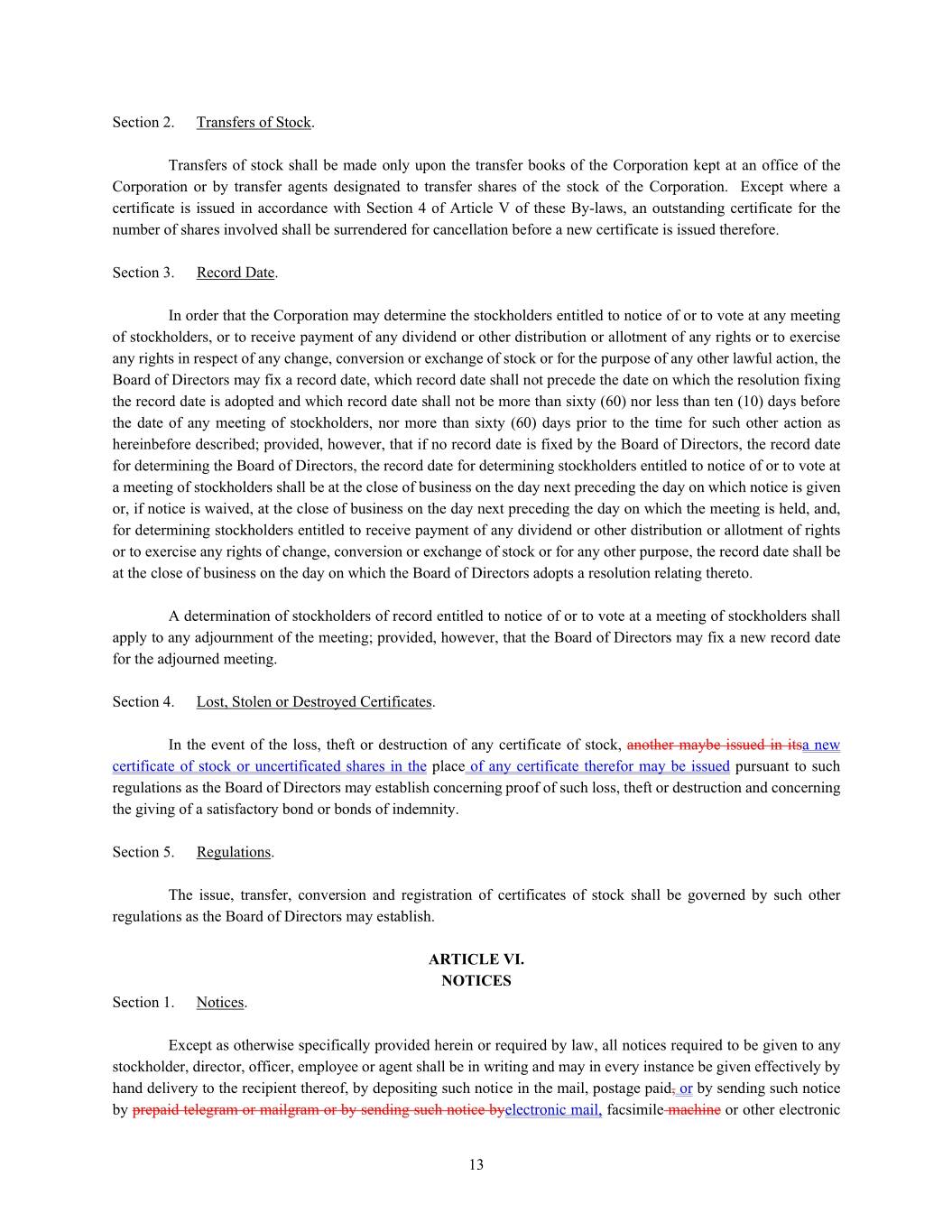
Section 2. Transfers of Stock. Transfers of stock shall be made only upon the transfer books of the Corporation kept at an office of the Corporation or by transfer agents designated to transfer shares of the stock of the Corporation. Except where a certificate is issued in accordance with Section 4 of Article V of these By-laws, an outstanding certificate for the number of shares involved shall be surrendered for cancellation before a new certificate is issued therefore. Section 3. Record Date. In order that the Corporation may determine the stockholders entitled to notice of or to vote at any meeting of stockholders, or to receive payment of any dividend or other distribution or allotment of any rights or to exercise any rights in respect of any change, conversion or exchange of stock or for the purpose of any other lawful action, the Board of Directors may fix a record date, which record date shall not precede the date on which the resolution fixing the record date is adopted and which record date shall not be more than sixty (60) nor less than ten (10) days before the date of any meeting of stockholders, nor more than sixty (60) days prior to the time for such other action as hereinbefore described; provided, however, that if no record date is fixed by the Board of Directors, the record date for determining the Board of Directors, the record date for determining stockholders entitled to notice of or to vote at a meeting of stockholders shall be at the close of business on the day next preceding the day on which notice is given or, if notice is waived, at the close of business on the day next preceding the day on which the meeting is held, and, for determining stockholders entitled to receive payment of any dividend or other distribution or allotment of rights or to exercise any rights of change, conversion or exchange of stock or for any other purpose, the record date shall be at the close of business on the day on which the Board of Directors adopts a resolution relating thereto. A determination of stockholders of record entitled to notice of or to vote at a meeting of stockholders shall apply to any adjournment of the meeting; provided, however, that the Board of Directors may fix a new record date for the adjourned meeting. Section 4. Lost, Stolen or Destroyed Certificates. In the event of the loss, theft or destruction of any certificate of stock, another maybe issued in itsa new certificate of stock or uncertificated shares in the place of any certificate therefor may be issued pursuant to such regulations as the Board of Directors may establish concerning proof of such loss, theft or destruction and concerning the giving of a satisfactory bond or bonds of indemnity. Section 5. Regulations. The issue, transfer, conversion and registration of certificates of stock shall be governed by such other regulations as the Board of Directors may establish. ARTICLE VI. NOTICES Section 1. Notices. Except as otherwise specifically provided herein or required by law, all notices required to be given to any stockholder, director, officer, employee or agent shall be in writing and may in every instance be given effectively by hand delivery to the recipient thereof, by depositing such notice in the mail, postage paid, or by sending such notice by prepaid telegram or mailgram or by sending such notice byelectronic mail, facsimile machine or other electronic 13
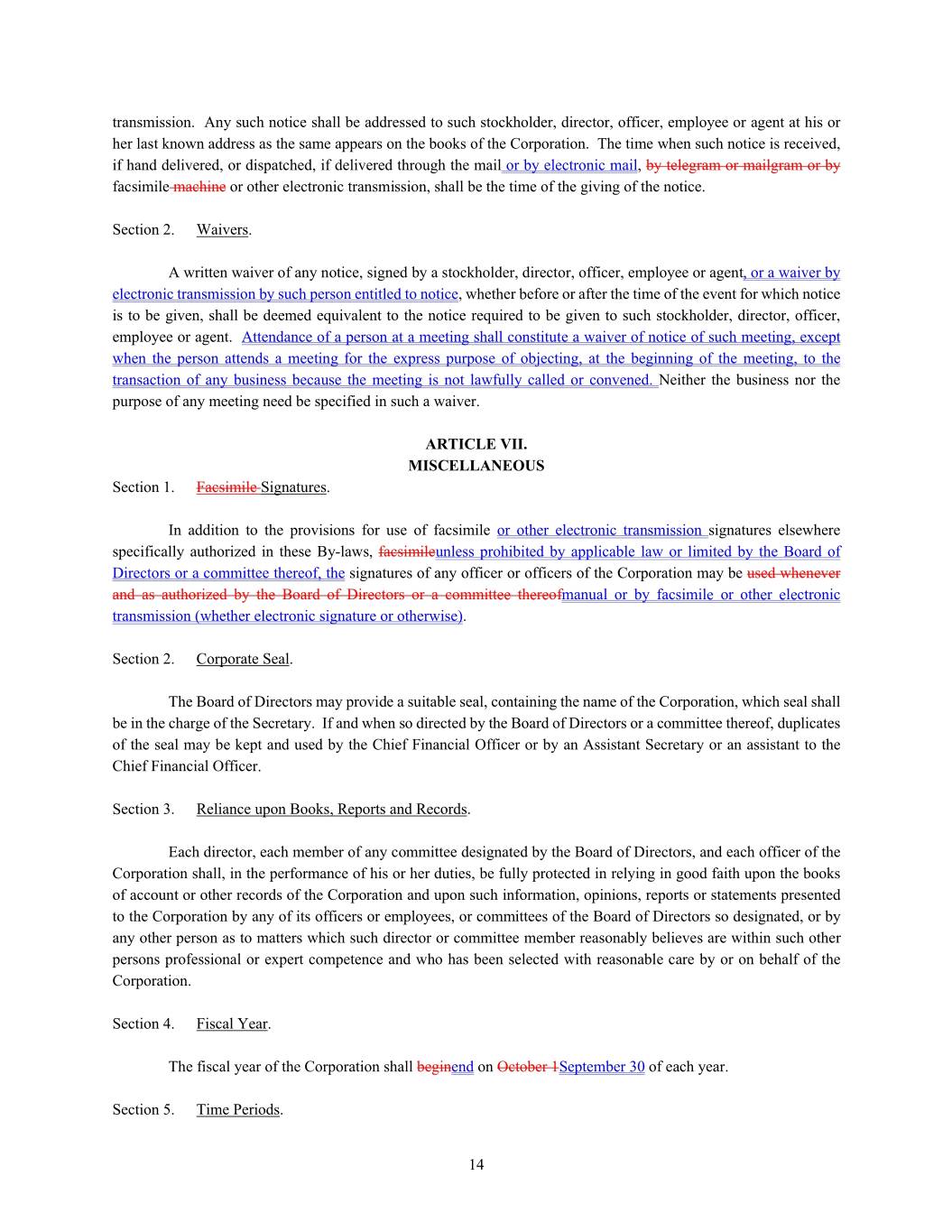
transmission. Any such notice shall be addressed to such stockholder, director, officer, employee or agent at his or her last known address as the same appears on the books of the Corporation. The time when such notice is received, if hand delivered, or dispatched, if delivered through the mail or by electronic mail, by telegram or mailgram or by facsimile machine or other electronic transmission, shall be the time of the giving of the notice. Section 2. Waivers. A written waiver of any notice, signed by a stockholder, director, officer, employee or agent, or a waiver by electronic transmission by such person entitled to notice, whether before or after the time of the event for which notice is to be given, shall be deemed equivalent to the notice required to be given to such stockholder, director, officer, employee or agent. Attendance of a person at a meeting shall constitute a waiver of notice of such meeting, except when the person attends a meeting for the express purpose of objecting, at the beginning of the meeting, to the transaction of any business because the meeting is not lawfully called or convened. Neither the business nor the purpose of any meeting need be specified in such a waiver. ARTICLE VII. MISCELLANEOUS Section 1. Facsimile Signatures. In addition to the provisions for use of facsimile or other electronic transmission signatures elsewhere specifically authorized in these By-laws, facsimileunless prohibited by applicable law or limited by the Board of Directors or a committee thereof, the signatures of any officer or officers of the Corporation may be used whenever and as authorized by the Board of Directors or a committee thereofmanual or by facsimile or other electronic transmission (whether electronic signature or otherwise). Section 2. Corporate Seal. The Board of Directors may provide a suitable seal, containing the name of the Corporation, which seal shall be in the charge of the Secretary. If and when so directed by the Board of Directors or a committee thereof, duplicates of the seal may be kept and used by the Chief Financial Officer or by an Assistant Secretary or an assistant to the Chief Financial Officer. Section 3. Reliance upon Books, Reports and Records. Each director, each member of any committee designated by the Board of Directors, and each officer of the Corporation shall, in the performance of his or her duties, be fully protected in relying in good faith upon the books of account or other records of the Corporation and upon such information, opinions, reports or statements presented to the Corporation by any of its officers or employees, or committees of the Board of Directors so designated, or by any other person as to matters which such director or committee member reasonably believes are within such other persons professional or expert competence and who has been selected with reasonable care by or on behalf of the Corporation. Section 4. Fiscal Year. The fiscal year of the Corporation shall beginend on October 1September 30 of each year. Section 5. Time Periods. 14
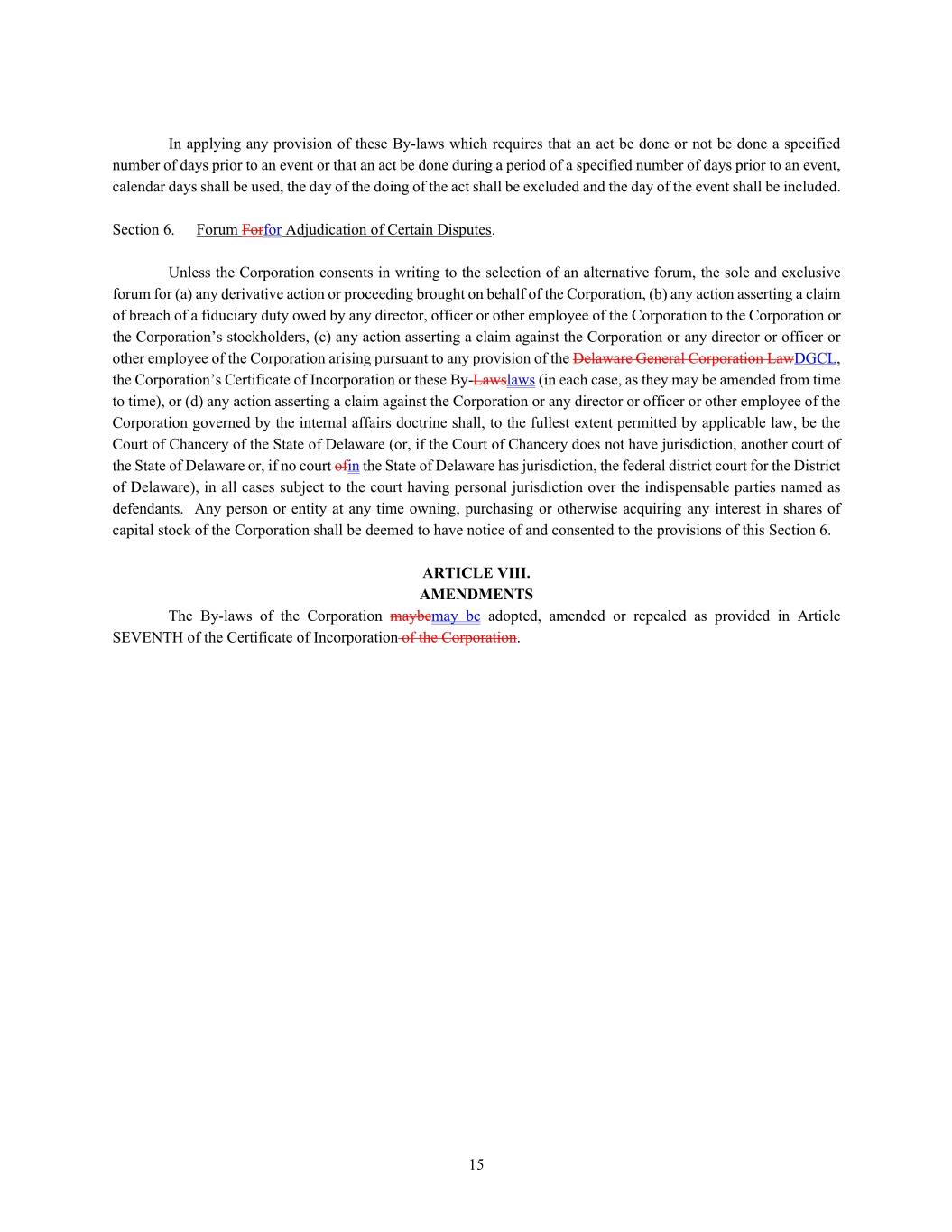
In applying any provision of these By-laws which requires that an act be done or not be done a specified number of days prior to an event or that an act be done during a period of a specified number of days prior to an event, calendar days shall be used, the day of the doing of the act shall be excluded and the day of the event shall be included. Section 6. Forum Forfor Adjudication of Certain Disputes. Unless the Corporation consents in writing to the selection of an alternative forum, the sole and exclusive forum for (a) any derivative action or proceeding brought on behalf of the Corporation, (b) any action asserting a claim of breach of a fiduciary duty owed by any director, officer or other employee of the Corporation to the Corporation or the Corporation’s stockholders, (c) any action asserting a claim against the Corporation or any director or officer or other employee of the Corporation arising pursuant to any provision of the Delaware General Corporation LawDGCL, the Corporation’s Certificate of Incorporation or these By-Lawslaws (in each case, as they may be amended from time to time), or (d) any action asserting a claim against the Corporation or any director or officer or other employee of the Corporation governed by the internal affairs doctrine shall, to the fullest extent permitted by applicable law, be the Court of Chancery of the State of Delaware (or, if the Court of Chancery does not have jurisdiction, another court of the State of Delaware or, if no court ofin the State of Delaware has jurisdiction, the federal district court for the District of Delaware), in all cases subject to the court having personal jurisdiction over the indispensable parties named as defendants. Any person or entity at any time owning, purchasing or otherwise acquiring any interest in shares of capital stock of the Corporation shall be deemed to have notice of and consented to the provisions of this Section 6. ARTICLE VIII. AMENDMENTS The By-laws of the Corporation maybemay be adopted, amended or repealed as provided in Article SEVENTH of the Certificate of Incorporation of the Corporation. 15
